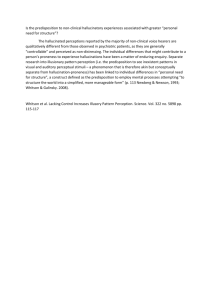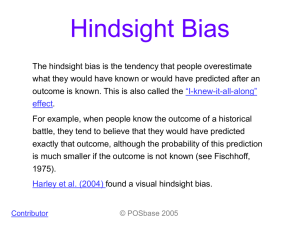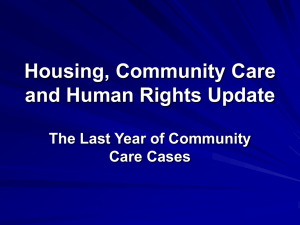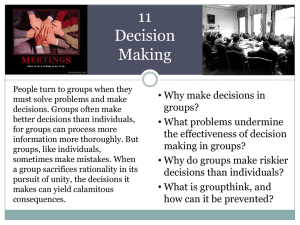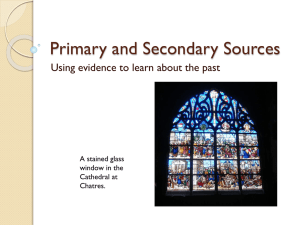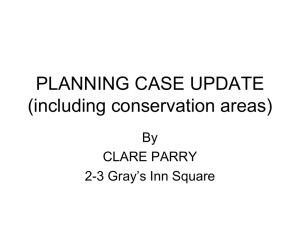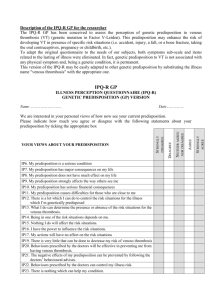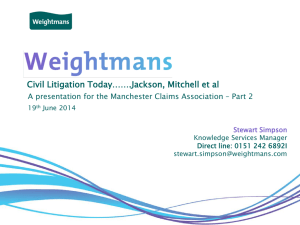full text - Cornerstone Barristers
advertisement
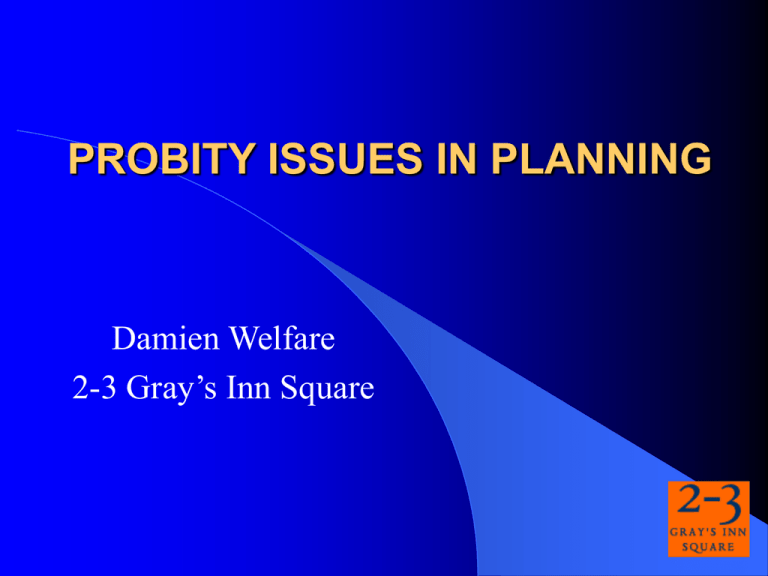
PROBITY ISSUES IN PLANNING Damien Welfare 2-3 Gray’s Inn Square Introduction • Disqualification of decision-makers on grounds of bias and predetermination • Contentious in relation to elected members • Cases had appeared to moving in more rigorous direction, especially on apparent bias • New direction in last twelve months Bias • Lord Hope in Magill v Weeks & Porter (2001) UKHL 67: “The question is whether the fair-minded and informed observer, having considered the facts, would conclude that there was a real possibility that the tribunal was biased”. • Whether real danger of influence by pecuniary or personal interest in outcome (Sedley J in Kirkstall Valley case [1996] 3 All ER 304) Apparent bias • Georgiou v LB Enfield and ors [2004] EWHC 779 (Admin) • Grants of listed building consent quashed on grounds of apparent bias on part of Planning Committee (and because decision taken with inadequate information). Interest in decision • Richardson & Orme v N Yorks CC & First Sec of State [2003] EWCA Civ 1860 • Paragraph 12 of Model Code • Any member with prejudicial interest must, in absence of dispensation, withdraw from meeting (inc committee of which not a member) • May not attend in “private capacity” Predetermination • Ouseley J in Bovis Homes v New Forest DC (2002) EWHC 483 (Admin): “predetermined the outcome ...by delegation…the adoption of an inflexible policy…the closing of its mind …because of a decision already reached or ….a determination to reach a particular view. It is seen in a corporate determination to adhere to a particular view, regardless of the relevant factors or how they could be weighed”. Legitimate predisposition • Ouseley J in R (Cummins) v LB Camden (2001) EWHC Admin 1735: “a predisposition, short of predetermination, arising say from prior consideration of the issues…..The decision-making structure …and the democratic accountability of councillors permit, indeed must recognise, the legitimate potential for predisposition towards a particular decision” Apparent bias – Bluestone case • Council for National Parks Ltd v Pembrokeshire Coast Nat Park Auth & ors [2004] EWHC 2907 (Admin) (“Bluestone”) • Two members of County Council voted in favour of permission • Ten matters. Jack J. found none individually suggested a real possibility of bias. Overall, the members took a proper approach. • Bias not pursued in Court of Appeal: [2005] EWCA Civ 888 Freemasonry - Port Regis case • Port Regis School Ltd (R on applic of) v Nth Dorset DC & ors [2006] EWHC 742 (Admin) • Freemason was not, by reason of membership, to be restrained from participating in decision whenever another freemason or branch had an interest in the outcome Election manifesto – Bridgend case • Island Farm Developments Ltd (R on applic of) v Bridgend CBC [2006] EWHC 2189 (Admin) • No apparent bias or pre-determination by newly elected authority in deciding to discontinue negotiations for sale of land. • No positive evidence of closed mind Bridgend case (cont) • Councillors entitled to have regard to and apply policies they believed in, particularly if they formed part of an election manifesto Careless talk – the Condron case • National Assembly of Wales v Condron & or [2006] EWCA Civ 1573 • Minister for Environment, Carwyn Jones AM, was “going to go with the Inspector’s report” • At first instance, Lindsay J found “real possibility of bias” • CA held matters have to be set in context, which is broad Condron: objective test • Test: whether fears expressed by the complainant at the initial stage are objectively justified when investigated (Richards LJ, per L. Hope in Magill). • Or: not what the fair-minded and informed observer would have concluded on the date of the incident, but what the same observer would conclude having considered all the facts as they are now known (Wall LJ) Condron: legitimate predisposition • Words showed a predisposition to follow Inspectors’ report, rather than closed mind (Richards LJ) • “Impartiality consists in the absence of a predisposition to favour the interests of either side in the dispute” (quoting L. Hope in Gillies v SofS Work and Pensions [2006] UKHL 2) • Legitimate predisposition is consistent with “preparedness to consider and weigh relevant factors in reaching final decision” Condron: legitimate predisposition (cont) • Illegitimate predetermination: “involves a mind that is closed to the consideration and weighing of relevant factors”. Condron: position of Minister • Nothing surprising in relevant Minister having predisposition in favour of grant of planning permission as recommended by the Inspector Conclusion • Changes to Code to remove barriers to councillors speaking up for constituents, or public bodies to which appointed, on planning matters • Significant easing of constraints • Guidance from Standards Board will need to be revised
